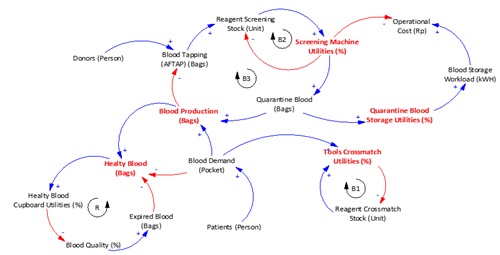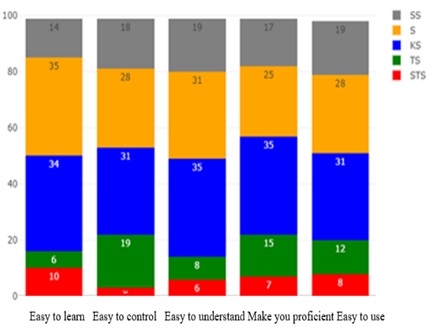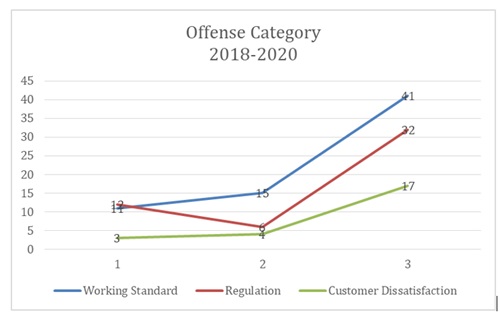The Analysis Of Blood Supply Chain Performance Based On Supply Chain Operation Reference Model And Causal Loop Diagram Approach
Versions

Downloads
Downloads
[1] William J. Stevenson, Operations Management. New York: McGraw-Hill, 2005.
[2] Nugrahayu, "Penerapan Metode Balanced Scorecard Sebagai Tolok Ukur Pengukuran Kinerja Perusahaan,” J. Ilmu Ris. Akunt., vol. 4, no. 10, pp. 1–16, 2015.
[3] A. Mansur, I. Vanany, and N. Indah Arvitrida, "Challenge and opportunity research in blood supply chain management: A literature review,” MATEC Web Conf., vol. 154, pp. 1–6, 2018.
[4] J. Belií«n and H. Forcé, "Supply chain management of blood products: A literature review,” Eur. J. Oper. Res., vol. 217, no. 1, pp. 1–16, 2012.
[5] R. Rayendra and B. M. Sopha, "Analisis Pengendalian Persediaan Produk Darah Pada Unit Pelayanan Bank Darah Rumah Sakit X Yogyakarta,” Semin. Nas. Tek. Ind. Univ. Gajah Mada, pp. 95–99, 2019.
[6] K. P. H. Lemmens et al., "Why don't young people volunteer to give blood? An investigation of the correlates of donation intentions among young nondonors,” Transfusion, vol. 45, no. 6, pp. 945–955, Jun. 2005.
[7] A. Pirabán, W. J. Guerrero, and N. Labadie, "Survey on blood supply chain management: Models and methods,” Comput. Oper. Res., 2019.
[8] G. E. Delipinar and B. Kocaoglu, "Using SCOR Model to Gain Competitive Advantage: A Literature Review,” Procedia - Soc. Behav. Sci., vol. 229, pp. 398–406, 2016.
[9] S. Prakash, Sandeep, G. Soni, and A. P. S. Rathore, "Supply Chain Operations Reference ( Scor ) Model"¯: an Overview and a Structured Literature Review of Its,” Proc. Int. Conf. Smart Technol. Mech. Eng. Technol. Univ., no. October 2013, p. pp-55, 2013.
[10] S. Azmiyati and S. Hidayat, "Pengukuran Kinerja Rantai Pasok pada PT. Louserindo Megah Permai Menggunakan Model SCOR dan FAHP,” J. Al-AZHAR Indones. SERI SAINS DAN Teknol., vol. 3, no. 4, p. 163, 2017.
[11] D. T. Liputra, S. Santoso, and N. A. Susanto, "Pengukuran Kinerja Rantai Pasok Dengan Model Supply Chain Operations Reference (SCOR) dan Metode Perbandingan Berpasangan,” J. Rekayasa Sist. Ind., vol. 7, no. 2, p. 119, 2018.
[12] R. R. Chotimah, B. Purwanggono, and A. Susanty, "Pengukuran Kinerja Rantai Pasok Menggunakan Metode SCOR dan AHP Pada Unit Pengantongan Pupuk Urea PT. Dwimatama Multikarsa Semarang,” Ind. Eng. Online J., vol. 6, no. 4, pp. 1–8, 2017.
[13] R. Anissa, "Supply Chain Management Sustainability Through the Performance Improvement of MTS-MTO Production System Typology,” J. Manaj. Ind. Dan Logistik, vol. 1, no. 1, p. 58, 2017.
[14] R. Nazim and R. A. I. R. Yaacob, "Criteria for Supplier Selection: An Application of AHP-SCOR Integrated Model (ASIM),” Int. J. Supply Chain Manag., vol. 6, no. 3, 2017.
[15] E. Ayyildiz and A. Taskin Gumus, "Interval-valued Pythagorean fuzzy AHP method-based supply chain performance evaluation by a new extension of SCOR model: SCOR 4.0,” Complex Intell. Syst., vol. 7, no. 1, pp. 559–576, Feb. 2021.
[16] Q. Long, "Distributed supply chain network modelling and simulation: integration of agent-based distributed simulation and improved SCOR model,” Int. J. Prod. Res., vol. 52, no. 23, pp. 6899–6917, Dec. 2014.
[17] F. Persson and M. Araldi, "The development of a dynamic supply chain analysis tool”Integration of SCOR and discrete event simulation,” Int. J. Prod. Econ., vol. 121, no. 2, pp. 574–583, Oct. 2009.
[18] APICS, "Supply Chain Operations Reference Model Version 12.0 (V12 ed., Issue Supply Chain Operations Reference Model),” 2017.
[19] P. Thaha, "Pengembangan Model Pengukuran Kinerja Rantai Pasok pada Industri Konstruksi Perumahan. Sumatera Barat,” Univ. Andalas Padang, 2016.
[20] D. T. Liputra and N. A. Susanto, "Pengukuran Kinerja Rantai Pasok dengan Model Supply Chain Operation References (SCOR) dan Metode Perbandingan Berpasangan,” vol. 7, no. 2, pp. 119–125, 2018.
[21] A. Hasibuan, A., Arfah, M., Parinduri, L., Hernawati, T., Suliawati, Harahap, B., Sibuea, S. R., Sulaiman, O. K., & Purwadi, Performance analysis of Supply Chain Management with Supply Chain Operation reference model, vol. 1. Conference Series, 2018.
[22] J. H. Trienekens and H. H. Hvolby, "Performance measurement and improvement in supply chains,” in Proceedings of the third CINET Conference; CI 2000 From improvement to innovation"¯: CINET Conference: CI 2000 From Improvement to innovation, 2000, pp. 399–409.
[23] D. Irfangi, A., Aziz, F. A., R. Adawiyah, W., & Darmawati, "Identifikasi Penyebab Hambatan Supply Chain Management PPDB Menggunakan Causal Loop Diagram,” J. Teknol. Dan Bisnis, vol. 2 (1), pp. 15–28, 2020.
[24] Y. Zhou, T. Zou, C. Liu, H. Yu, L. Chen, and J. Su, "Blood supply chain operation considering lifetime and transshipment under uncertain environment,” Appl. Soft Comput., vol. 106, p. 107364, Jul. 2021.
[25] A. Mansur, F. Mar'ah, and P. Amalia, "Platelet Inventory Management System Using Monte Carlo Simulation,” IOP Conf. Ser. Mater. Sci. Eng., vol. 722, no. 1, p. 012004, Jan. 2020.
Copyright (c) 2023 Agus Mulyadi, St. Nova Meirizha, Muhammad Qurthuby, Mela Sundari

This work is licensed under a Creative Commons Attribution 4.0 International License.
JMIL Jurnal Manajemen Industri dan Logistik (Journal of Industrial and Logistics Management) is an Open Access Journal. The authors who publish the manuscript in JMIL Jurnal Manajemen Industri dan Logistik agree to the following terms:

JMIL Jurnal Manajemen Industri dan Logistik is licensed under a Creative Commons Attribution 4.0 International License. This permits anyone to copy, redistribute, remix, transmit and adapt the work provided the original work and source is appropriately cited.
This means:
(1) Under the CC-BY license, authors retain ownership of the copyright for their article, but authors grant others permission to use the content of publications in JMIL Jurnal Manajemen Industri dan Logistik in whole or in part provided that the original work is properly cited. Users (redistributors) of JMIL Jurnal Manajemen Industri dan Logistik are required to cite the original source, including the author's names, JMIL Jurnal Manajemen Industri dan Logistik as the initial source of publication, year of publication, volume number, issue, and Digital Object Identifier (DOI); (2) Authors grant JMIL Jurnal Manajemen Industri dan Logistik the right of first publication. Although authors remain the copyright owner.





























